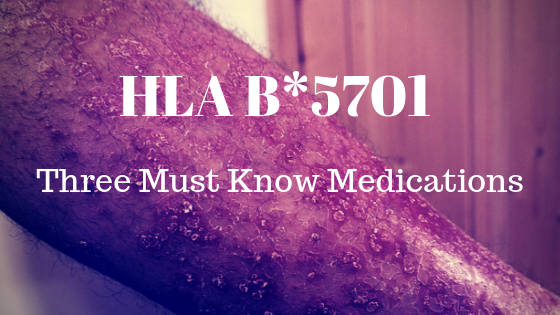What the heck is HLA B*5701? Let’s start with the HLA. HLA stands for human leukocyte antigen. The rest of the name is simply indicating that it is subtype of HLA. There are many different subtypes of HLA as mentioned with each specific medication below. You might be thinking, what does this have to do with medications? It can have a substantial impact on whether patients have a severe allergic/skin reaction to a specific medication.
This specific gene has highest prevalence in countries in southwest Asia. In this geographical area, the presence of HLA B*5701 might be up to 20% of the population. I’ve definitely seen this concept be tested on various pharmacy exams throughout my career and some medications actually require testing prior to administration – see below. So here’s my list of medications and HLA subtypes that can be very important in patient care. As a hint, remember the acronym ACA.
Abacavir and HLA B*5701
I must confess, that I’m not a perfect HIV/AIDS expert when it comes to all the different medications, but abacavir is a NRTI that can be used as part of an antiretroviral regimen. There is actually a boxed warning with this medication and use of the drug is contraindicated in patients who have the HLA B*5701 allele. Patients with the allele have an increased risk of severe hypersensitivity reactions. It is also required to screen for the allele prior to beginning drug therapy.
Carbamazepine and HLA B*1502
Carbamazepine is a seizure medication that can also be used in the management of bipolar disorder and trigeminal neuralgia. It is associated an increased risk of hypersensitivity reactions in patients who are positive for the HLA B*1502 allele. There is a boxed warning on this risk and testing should be considered, especially in patients that may be at higher risk (i.e. certain ethnicities, family history of reaction, etc.). Use is not recommended if the patient is positive for the HLA B*1502 allele.
Allopurinol and HLA B*58:01
Allopurinol is a very commonly used medication in the management of gout. It is the mainstay in reducing uric acid levels and preventing future gout flares. There are a few clinical pearls with allopurinol (like this classic drug interaction), but the hypersensitivity risk is one that is often forgotten about. Patients with the HLA B*58:01 allele are at higher risk for hypersensitivity reactions. Screening is not mandatory like it is for abacavir, but can be considered.
Love the blog? Get a free gift simply for following! Over 5,000 medication loving healthcare professional have taken advantage of this!



I thought allopurinol was HLA-B 5801 and carbamazepine was HLA-B 1502?
Thank you so much for the clarification, that was an error on my part and I have updated the article accordingly!!! As always let me know if you see anything that doesn’t look right – Thanks again, we’re all in this together 🙂 Eric